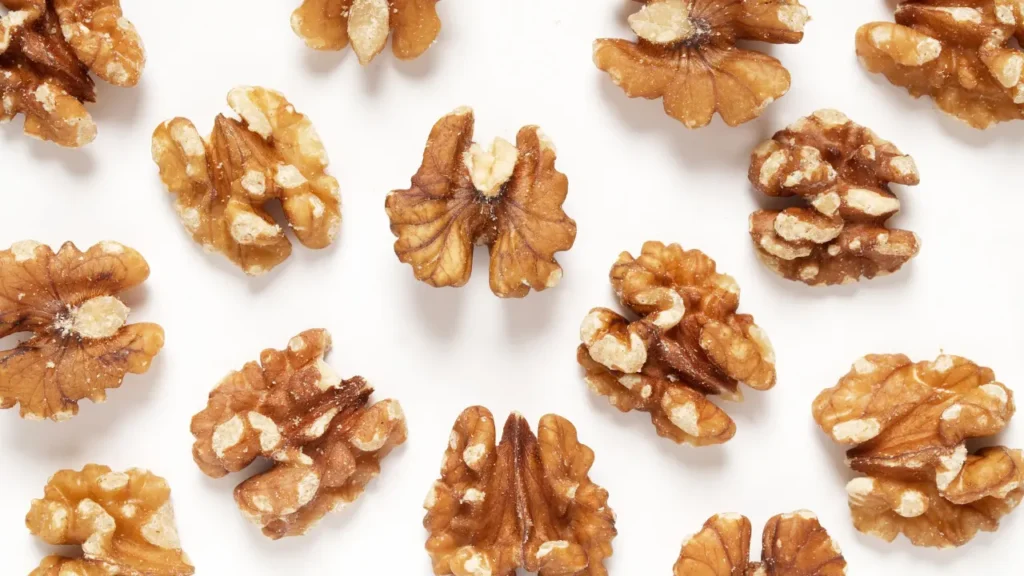Native to North America, the black walnut (Juglans nigra) tree is prized for its useful wood, delectable nuts, and therapeutic benefits. Black walnut green hulls have long been used to cure a variety of illnesses, including parasite infections, skin diseases, and digestive problems. Due to its distinct chemical composition, black walnut has recently become recognized as a nutritional supplement that provides various health benefits. The nature, health advantages, recommended dosage, negative effects, possible drug interactions, and responsible usage of black walnut as a nutritional supplement are all thoroughly examined in this article.
You May Also Like:
Diamond CBD Gummies vs. Joy Organics CBD Gummies
Sunmed CBD vs. Partnered Process CBD: Finding the Best CBD for Sleep
Black Walnut: Benefits, Dosage, Side Effects, Drug Interactions, and Other Important Information is an original (NootropicsPlanet) article.
Nature of Black Walnut
The Juglandaceae family includes the deciduous hardwood tree known as the black walnut. Its natural range extends from southern Ontario, Canada, through Texas and Georgia in the United States. It is indigenous to eastern North America. The tree’s trunk diameter can reach 4 feet (1.2 meters), and its height can reach up to 100 feet (30 meters). It is distinguished by its pinnately compound leaves with 15–23 leaflets and black, deeply furrowed bark.
The black walnut tree produces a huge, spherical, green drupe with a hard, thick-shelled nut inside. The bioactive chemicals that give black walnuts its therapeutic benefits are found in the fruit’s green outer hull. The fruit’s hull turns black and develops a potent, unmistakable odor as it ripens. The nuts within are an important dietary source since they are loaded with vitamins, proteins, and lipids.
The black walnut tree is prized for its wood, which is used to make furniture, veneer, and cabinetry, in addition to its nuts and medicinal qualities. The wood is a great option for both indoor and outdoor applications because it is solid, sturdy, and very resistant to deterioration.
Health Benefits of Black Walnut
- Treatment of parasitic infections, such as intestinal worms and protozoa: Black walnut has long been used to combat parasitic diseases. Juglone and other naphthoquinones are effective natural treatments for various illnesses due to their antiparasitic effects.
- Antimicrobial activity: Black walnuts have antimicrobial qualities that can help treat a variety of skin and soft tissue illnesses, including bacterial infections like acne and impetigo as well as fungal infections like ringworm and athlete’s foot.
- Digestive problems: Black walnuts have been used to treat digestive issues like constipation, diarrhea, and bloating. It helps to encourage regular bowel motions and soothe inflamed tissues because of its astringent and anti-inflammatory qualities.
- Cardiovascular health: By lowering inflammation, enhancing endothelial function, and limiting platelet aggregation, the ALA component in black walnuts benefits cardiovascular health.

Chemistry of Black Walnut
The green hulls of black walnuts contain naphthoquinones, phenolic compounds, flavonoids, and tannins, which are the main bioactive components. Juglone (5-hydroxy-1,4-naphthoquinone), a natural naphthoquinone with strong antifungal, antibacterial, and antiparasitic activities, is one of the most significant components. Plumbagin, lawsone, and juglandin are also important chemicals with antioxidant, anti-inflammatory, and cytotoxic properties. In addition, black walnuts are a good source of essential fatty acids, particularly alpha-linolenic acid (ALA), an omega-3 fatty acid that promotes cardiovascular and cognitive health.
Physiological Mechanism of Action
Through a number of different mechanisms, black walnut produces its therapeutic effects, including:
- Antiparasitic action: Juglone’s primary mode of action is stopping the respiratory chain in parasitic organisms, which kills them. By absorbing electrons and producing reactive oxygen species (ROS), which lead to oxidative stress and damage to the parasites’ cellular structures, it interferes with the electron transport chain.
- Antimicrobial activity: Juglone and other naphthoquinones work to inhibit bacterial growth by interfering with their cell walls and membranes, which compromises the integrity of those structures and allows intracellular contents to seep out. Additionally, they can prevent the activity of vital enzymes required for bacterial DNA replication and cell division, including DNA gyrase and topoisomerase.
- Flavonoids and phenolic compounds in black walnuts have antioxidant and anti-inflammatory capabilities. They do this by scavenging free radicals and preventing the release of pro-inflammatory cytokines. Additionally, these substances have the ability to control the activity of inflammatory response-related enzymes like cyclooxygenase (COX) and lipoxygenase (LOX).
- Cardiovascular health: By lowering inflammation, enhancing endothelial function, and limiting platelet aggregation, the high ALA content of black walnuts contributes to the maintenance of cardiovascular health.

Optimal Dosage of Black Walnut
The ideal dosage of black walnut can be difficult to determine because it varies on the supplement’s type, the seriousness of the ailment being treated, and the health of the person taking it. A healthcare practitioner must be consulted before beginning any supplement plan. The following dosages are recommended as a general rule for different kinds of black walnuts:
- Take 2-4 mL of the 1:1:5 tincture three times each day.
- Black walnut husk powder-containing capsules, 250–500 mg, two–three times daily.
- Decoction (tea): Take two to three times per day by steeping one to two teaspoons of crushed black walnut hulls in a cup of hot water for fifteen minutes.
Side Effects and Contraindications
When used as recommended, black walnut is generally regarded as safe. However, some people may develop side effects or allergic responses. When used topically, potential side effects include skin irritation, diarrhea, and gastrointestinal discomfort. Rashes, breathing problems, and facial, lip, or tongue swelling are examples of allergic reactions. Stop using it in these situations, and seek emergency medical advice.
Black walnut is not advised for use by women who are expecting or nursing because there is no proof of its safety during these times. Additionally, taking supplements containing black walnuts is not advised for people with known nut allergy, particularly to walnuts.

Potential Substance Interactions
Black walnuts may interact with some drugs and substances, reducing their effectiveness or increasing their negative effects. Among the possible interactions are:
- Anticoagulants and antiplatelet medications: ALA, found in black walnut, may boost the effects of anticoagulants and antiplatelet treatments, raising the risk of bleeding. Before combining black walnut with these drugs, speak with a medical expert.
- Thyroid medications: Studies have revealed that the main active ingredient in black walnuts, juglone, inhibits thyroid peroxidase, a key enzyme in the synthesis of thyroid hormones. Individuals taking thyroid medications, such as levothyroxine, may be impacted by this interaction. Before consuming supplements containing black walnuts, check with your healthcare professional if you are taking thyroid medication.
Best Responsible Uses of Black Walnut
Consider the following suggestions to ensure the best ethical use of black walnut as a nutritional supplement:
- Before beginning any supplementing regimen, speak with a medical expert, especially if you have any pre-existing conditions, are on medication, are pregnant, or are nursing.
- Select supplements of the highest caliber from reliable producers who are transparent about the production method, raw materials, and standardization of their goods.
- Begin with the lowest dosage advised and gradually raise it as necessary, watching for any adverse reactions or side effects.
- Adhere to the directions and dosages for each type of black walnut supplement.
- Stop using immediately and seek medical advice if you have any negative effects or allergic reactions.
Black Walnut:
Conclusion
Black walnuts are known for their unique flavor and nutritional profile, and some potential health benefits have been associated with their consumption. However, it’s important to note that scientific research on the health benefits of black walnuts is limited, and individual responses may vary. As with any food or supplement, it’s best to include black walnuts as part of a balanced and varied diet. More research is needed to understand the extent of their health benefits fully and potential risks.

References:
- Black walnut (Juglans nigra): A review on its potential uses and health benefits. Retrieved from: https://www.ncbi.nlm.nih.gov/pmc/articles/PMC6517585/
- Antimicrobial activity of Juglans nigra fruit and green hull extracts. Retrieved from: https://pubmed.ncbi.nlm.nih.gov/18638091/
- Juglone in the management of gastrointestinal disorders and other diseases: A comprehensive review. Retrieved from: https://www.ncbi.nlm.nih.gov/pmc/articles/PMC7961876/
Important Note: The information contained in this article is for general informational purposes only, and should not be construed as health or medical advice, nor is it intended to diagnose, prevent, treat, or cure any disease or health condition. Before embarking on any diet, fitness regimen, or program of nutritional supplementation, it is advisable to consult your healthcare professional in order to determine its safety and probable efficacy in terms of your individual state of health.
Regarding Nutritional Supplements Or Other Non-Prescription Health Products: If any nutritional supplements or other non-prescription health products are mentioned in the foregoing article, any claims or statements made about them have not been evaluated by the U.S. Food and Drug Administration, and such nutritional supplements or other health products are not intended to diagnose, treat, cure, or prevent any disease.


